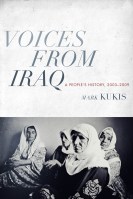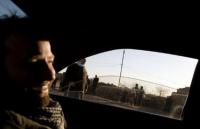
Collateral damage writ large
We always think of “collateral damage” as harm done to individuals by a wayward bomb. But sometimes collateral damage applies to an entire nation. That’s the sense you get from Mark Kukis’ new book, Voices from Iraq, a People’s History, 2003-2009. He delves into the shards of war to see how those most affected — after all, we invaded in their name — are faring at picking up the pieces. These translated interviews of chats with Iraqis detail the roller-coaster ride — the exhilarating highs and the woebegone lows — the U.S. and its allies wrought on that ancient land. Kukis, now studying international relations at Boston University, covered the war for Time from Baghdad. He conducted this email exchange with Battleland earlier this week:
Why did you write this book?
I wanted to write an account of America’s war years in Iraq as told entirely by Iraqis, because I felt the Iraqi perspective has been underrepresented in books and media coverage. Most of what we read and hear about Iraq comes from the perspective of journalists, soldiers and commentators. There seemed to be, to me, a shortage of Iraqi voices in the discussion of the war, especially in books. An avalanche of books has flowed from the war in Iraq, but very few of them offer a clear view of what it all looked like through Iraqi eyes.
Who is the most interesting person you spoke to, and why?
That’s impossible to say. I interviewed roughly 100 Iraqis for the book. Each interview started with the same simple question: Please tell me how the 2003 invasion and following years affected your life. Virtually all of the stories were moving in one way or another. But perhaps the interview that affected me the most was one in which an insurgent described staging a roadside bomb attack on U.S. soldiers. He explained in detail the process of making and detonating the bomb, reflecting on his emotions and impressions in a thoughtful, articulate way.
The interview affected me profoundly because as a reporter frequently embedded with U.S. forces I had witnessed such attacks up close and seen the horrible aftermath. Hearing someone talking from the other side of that violence was especially disturbing. That interview left me deeply shaken because it vivified in a chilling way some personal experiences of mine. But that was just me. The book includes interviews with people from all walks of life. There are many interviews with Iraqis who are parents. I think any parent who has ever worried about their child would likely find their stories more moving and relatable than the one that affected me. That was another aim of the book, to find a wide range of Iraqis whose stories would resonate with a wide range of average Americans.
Do they hate us or love us for what we did to their country?
Iraqi feelings and opinions about the U.S. invasion are varied, nuanced and not easily categorized. But most Iraqis I would say are genuinely glad to be rid of Saddam Hussein. Even those Iraqis whose previous lives revolved around loyalty to the old regime struggle to imagine a brighter future for Iraq if Saddam Hussein had stayed in power. And of course many Iraqis were elated by his downfall. The fact that it came at the hands of foreign army stirred little anger from what I heard.

Kukis in Baghdad, 2008
You have to remember that invading armies have been warring across Iraq since roughly the third millennium BC. Iraqi society is somewhat inured to foreign invasion. But the way the U.S. handled the occupation after the invasion angers virtually every Iraqi, even those who welcomed it.
Do they have a point?
Yes, certainly. The many ways in which the Bush administration bungled the occupation, especially in the early days, are well known. The unforgivable occupation mistake Iraqis mention again and again is the disbanding of the Iraqi army. It is difficult to overstate how huge a blunder that was.
By way of context, think of the scenes we saw on the streets of Cairo during the uprising against former Egyptian President Hosni Mubarak. An outpouring of respect and affection flowed from everyday Egyptians to the army in a time of crisis for the country. When all else was uncertain Egyptians trusted in their army, an institution long seen as serving the state rather than any one leader.
Iraqis largely felt the same way about their army in 2003. The Iraqi army belonged to Iraq, not Saddam Hussein. At least that’s how many, many Iraqis saw it. The Bush administration failed to recognize this widespread sentiment and swept the army away on a whim as though it were a wing of the Ba’ath party.
That was more damning than the invasion itself in the minds of many Iraqis. Much of whatever goodwill there may have been toward the U.S. presence in Iraq quickly fell away after this, and there was little the United States could do to earn it back as problems and difficulties mounted in the following years.
What does Iraq’s near-term future look like to them? Do you agree?
The near-term future looks rather bleak to many Iraqis, mainly because of the persistently high violence. No nation can think of itself as normal or stable when bombs kill and maim hundreds each year in the biggest urban areas. I believe Iraq will grow economically in the coming years and return to its status as one of the most developed and wealthiest nations in the Middle East. You can have economic growth and high violence at the same time.
But most Iraqis I suspect will find little solace in economic gains so long as violence endures at the current levels, and there is little to suggest it will be easing. So, yes, I tend to join those in Iraq with a fairly dim view of the future given the violence.
What about the country’s long-term future?
Iraq’s oil resources are likely to bring significant wealth to the country in the years ahead, regardless of the level of violence. Where that wealth goes will determine Iraq’s fate. If that wealth simply flows into the hands of Iraq’s ruling elites and their foreign patrons, as has been the case in the past, then I think Iraq will continue to undergo violent turmoil indefinitely.
That’s the path Iraq is currently taking. The sitting government seems more interested in its own survival and enrichment than investing in the future of the country. Better leadership could change Iraq’s course. Perhaps that sounds a bit obvious, but nothing is more true when trying to see the long-term picture for Iraq. Unless there is some reasonably equitable distribution of Iraq’s immense oil wealth among the country’s main factions, violent conflict among them will persist.
Do they blame the U.S. for the lack of electricity eight years after we invaded?
Iraqis generally blame the Iraqi government for lack of government services, including electricity. When the power goes out, Iraqis tend to curse the Iraqi prime minister, not the U.S. president. There is a growing sense among Iraqis that the ongoing U.S. withdrawal leaves Iraqi problems in Iraqi hands these days. True, the roots of many of the problems are interwoven with the U.S. invasion and occupation in the minds of most Iraqis. But the passing of time has put some distance between what Iraqis feel they can blame today on the United States versus the Iraqi government.
Are they happy or nervous about the looming U.S. troop pullout?
On this question Iraqis have pretty clear feelings, and they fall into two categories based on sectarian identity. Shi’ites tend to be glad about the U.S. withdrawal. Thanks for getting rid of Saddam and leaving us in power, many would say. Now please go before you screw anything else up for us. This has pretty much been the stance of the Iraqi government and its supporters since 2006.
Disempowered Sunnis tend to want the United States to remain, or at least remain heavily involved. Sunnis largely see the United States as the only thing that can prevent the newly empowered Shi’ite majority from ruthlessly marginalizing them.
Those fears are well founded, I believe. The Sunni minority in Iraq is in for hard times. They will face increasing economic dislocation, especially if sectarian violence remains high. Car bombs by Sunni militants draw deep anger from Shi’ites into whole Sunni communities. This anger manifests itself in ways ranging from job discrimination to extrajudicial government arrest sweeps. The Sunnis definitely have the most to lose amid a fading U.S. presence in Iraq, and they know this acutely.
What is the most important thing you learned writing this book?
The impact the U.S. intervention had on Iraqi society was heavier and more widespread than I had fathomed before undertaking the book. So many people had their lives torn apart in Iraq because of the U.S. intervention. As I mention in the introduction for the book, the war directly affected more than 6 million people in Iraq, where the population is around 30 million. About 2.3 million Iraqis fled the country. Another 2.7 million were internally displaced as of 2008.
There are no concrete data on the number of civilian casualties, but a reasonable estimate is roughly 500,000. In Baghdad, where the violence was always the heaviest, almost everyone you meet has a friend of a family member who was killed. The experience of the U.S. invasion and occupation scarred the country much more deeply than even I as a correspondent there imagined.
What is the most important thing for Americans to know now about the Iraqi people?
Their lives are not so different than ours. Iraqis want what most people anywhere want – a good job, a safe place for their children to grow up, a home in which to grow old peacefully surrounded by loved ones. When you hear how they dealt with war when it came upon them, you can imagine yourself doing much the same.


